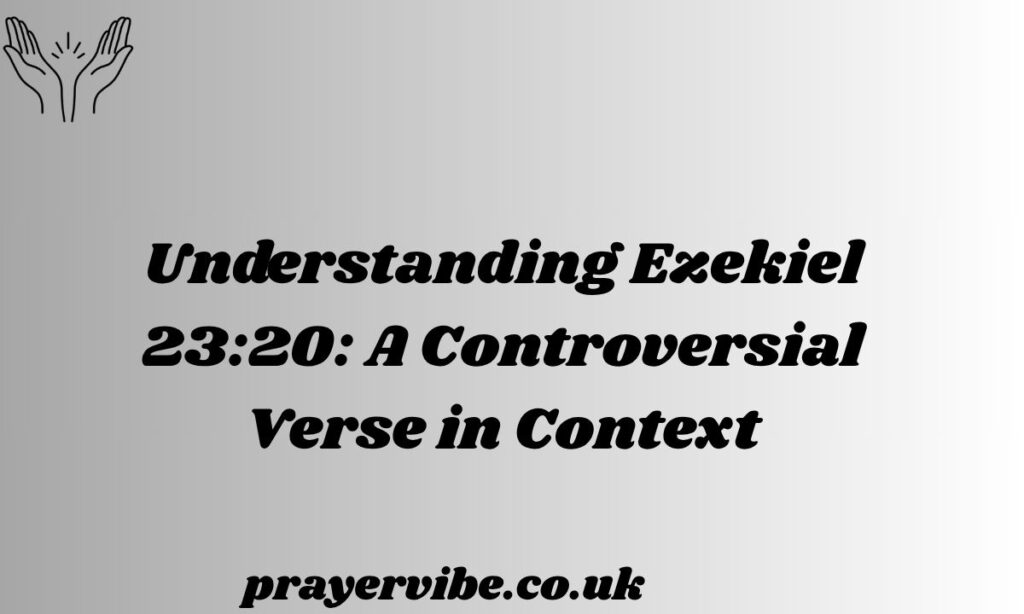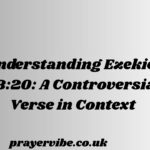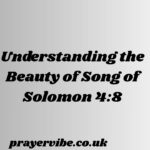Few Bible passages generate as many raised eyebrows as Ezekiel 23 20. Scrolling through search results for ezekiel 23 20 kjv, you will find reactions that range from amused to offended. Yet the verse is part of a carefully constructed prophetic drama, not mere shock literature. To appreciate what does Ezekiel 23 20 mean we have to step back, breathe, and let the whole chapter speak.
This article unpacks the text, explains why the prophet used such graphic language, and offers practical ways to reflect on the message today. Along the way we will touch the most-searched variations—ezekiel 23:20, ezekiel 23 19 20, ezekiel 23-20, even the frequently mistyped 23 20 ezekiel—so you leave with an informed, holistic view.
🙏 Divine Prayer Generator
Select a prayer category to begin
What Does Ezekiel 23:20 Say?
“For she lusted after her lovers, whose flesh is as the flesh of donkeys, and whose issue is like the issue of horses.”
— Ezekiel 23:20 KJV
Two things usually stand out:
- Animal imagery – “flesh of donkeys” and “issue of horses.”
- Sexual bluntness – The verse names lust in earthy terms.
Modern translations soften neither element; for example, the NIV speaks of “genitals like those of donkeys” and “emissions like those of horses.” In short, Ezekiel 23 20 King James Version is just as explicit as contemporary versions. The prophet’s words were designed to jolt his audience awake, not to provide polite devotional reading.
The Context of Ezekiel 23:20
1. The Allegory of Oholah and Oholibah
- Characters: Two sisters symbolize two capitals—Oholah (Samaria, northern Israel) and Oholibah (Jerusalem, Judah).
- Storyline: Both sisters enter political-religious “affairs” with pagan nations, abandoning covenant loyalty to Yahweh.
Verses 19-20 form the climax of Oholibah’s adultery. Ezekiel 23 19 20 actually resumes the thought of verse 17: Jerusalem “defiled herself” with Babylonian idols. The shocking animal comparisons highlight how far the spiritual infidelity has sunk.
2. The Broader Book of Ezekiel
Chapter 23 mirrors themes already raised in chapters 16 and 20. In fact, Ezekiel 20 23 (“I swore to scatter them among the nations”) anticipates the exile judgments now spelled out in graphic detail. By revisiting history from Egypt to Babylon, the prophet shows that persistent idolatry—not random fate—explains Jerusalem’s fall.
3. Literary Strategy
Hebrew prophets often used erotic or marital metaphors (see Hosea 1–3, Jeremiah 2–3). Ezekiel, however, pushes the imagery to its visceral limit. The blunt language serves to break denial: the people cannot shrug off their sin as innocent flirtation when the prophet likens it to extreme promiscuity.
Whose Genitals Were Like Those of Donkeys and Whose Emission Was Like That of Horses
This vivid and controversial line comes directly from Ezekiel 23:20, one of the most graphically intense verses in the entire Bible:
“She lusted after her lovers, whose genitals were like those of donkeys and whose emission was like that of horses.” – Ezekiel 23:20 (NIV)
Other versions, such as the KJV, render it more traditionally:
“For she doted upon their paramours, whose flesh is as the flesh of asses, and whose issue is like the issue of horses.” – Ezekiel 23:20 KJV
Who Is Being Described?
This verse is part of an extended allegory involving two sisters:
- Oholah = Samaria (Northern Kingdom of Israel)
- Oholibah = Jerusalem (Southern Kingdom of Judah)
In this specific verse, the focus is on Oholibah (Jerusalem) and her lustful alliance with Egypt. The “lovers” with animalistic attributes are symbolic representations of Egyptian men—not individuals, but Egypt as a whole.
The donkey and horse imagery is intentionally crude and offensive to a pious audience. It depicts how deeply Judah longed for the political protection and military strength of Egypt, betraying their covenant with God.
3 Lessons From Ezekiel 23:20
1. Sin Can Degrade Human Dignity
Ezekiel 23:20 uses intensely graphic imagery to show how far God’s people had fallen into spiritual and moral corruption. Comparing lust to animal instincts (“genitals like donkeys… emission like horses”) reveals a key truth:
When people abandon God, they often lose sight of their own dignity and purpose.
Lesson:
Sin doesn’t just offend God—it dehumanizes us. Whether it’s idolatry, addiction, or unethical alliances, the result is the same: people become driven by base desires rather than spiritual values.
2. Idolatry Is Not Just Wrong—It’s a Betrayal of Love
The verse is part of a broader allegory in which Israel and Judah are portrayed as unfaithful wives cheating on their divine husband.
Ezekiel is reminding us that our relationship with God isn’t merely legal—it’s relational and covenantal.
Lesson:
Spiritual compromise is not just breaking a rule—it’s breaking God’s heart.
Modern believers must ask: Where have we allowed our trust in wealth, culture, politics, or popularity to replace our trust in God?
3. God Uses Harsh Truth to Bring Healing
Ezekiel 23:20 is meant to shock. But it’s not written for the sake of humiliation—it’s written to confront sin and wake people up. The severity of the message matches the seriousness of the problem.
Lesson:
God doesn’t sugarcoat our failures—but He exposes them to bring us back.
Sometimes, we need blunt truth to break denial and bring transformation. The discomfort in Ezekiel’s language is a sign of divine mercy trying to save us before it’s too late.
The Purpose of Such Graphic Language
- Shock Therapy – Ancient audiences were no less modest than modern ones. Hearing ezekiel 23:20: read aloud in the temple courts would have seized everyone’s attention.
- Moral Mirror – Idolatry is spiritual adultery. The grotesque sexual picture mirrors the grotesque spiritual betrayal.
- Legal Indictment – Ezekiel plays prosecutor. By piling on explicit details he meets the legal requirement of witness testimony and shows that divine judgment is fully warranted.
- Rhetorical Contrast – Later promises of restoration (chs. 34–48) shine brighter when placed against the darkest backdrop of covenant infidelity.
So, when you see online claims like “ezekiel 23 20 explained—proof the Bible is obscene,” remember: obscenity alone was never the aim. The language is medicinal, not pornographic.
Why This Verse Matters
- Historical Insight – The verse crystallizes the late-pre-exilic atmosphere: frantic diplomacy, idolatry imported from Egypt and Babylon, and social decay.
- Theological Depth – It exposes the heart of sin: trading a faithful relationship with God for exploitive alliances that ultimately degrade the worshiper.
- Apologetic Relevance – Critics often cite ezekiel 23 20 kjv to dismiss Scripture. A thoughtful Christian response shows that difficult texts may still convey timeless truths once context is understood.
- Pastoral Warning – Any modern community—religious, corporate, or personal—that flirts with destructive loyalties can learn from Jerusalem’s tragedy.
How to Reflect on This Verse Today?
- Read the Whole Chapter at One Sitting
Isolated, Ezekiel 23 20 meaning sounds sensational. In context, it becomes a coherent element in a 49-verse allegory. - Compare Translations
Side-by-side reading of the KJV, ESV, and NIV shows nuance. For instance, “issue” (KJV) versus “ejaculation” (modern paraphrases) changes emotional impact but not the basic point. - Trace the Biblical Theme
From Exodus to Revelation, idolatry = adultery. Noticing the pattern keeps you from treating Ezekiel as an outlier. - Examine Your Own ‘Alliances’
Ask, What does Ezekiel 23 20 mean for my career ambitions, spending habits, political choices? Where do I trade integrity for short-term comfort? - Seek Restoration
The chapter does not end with doom; elsewhere Ezekiel promises a new heart and Spirit (36:26-27). Let conviction drive you to renewal, not despair.
Lessons from Ezekiel 23:20
- God Values Faithfulness – Covenant is relational, not ritual.
- Sin Dehumanizes – The animal imagery underscores how idolatry degrades dignity.
- Judgment Is Measured – Consequences fit the offense; God is neither capricious nor indifferent.
- Prophetic Honesty Hurts Before It Heals – Sometimes truth must bruise to save.
- Context Protects from Misuse – Quoting Ezekiel 23-20 as a joke strips it of prophetic power; studying it in situ restores that force.
Final Thoughts
If you made it this far, you have journeyed through one of Scripture’s most uncomfortable corridors. Yet grappling with Ezekiel 23 20 yields rich rewards: sharper historical insight, deeper theological awareness, and practical warnings for modern life. The next time a meme flashes ezekiel 23 20 explained to mock faith, you can gently respond, “Have you read the whole story?” Graphic language, yes—but in service of a moral vision that still speaks.
Where others see only scandal, the careful reader finds a mirror, a courtroom transcript, and ultimately an invitation—an invitation to renounce destructive liaisons and return to the One whose covenant love is steady even when ours is not.

Daniel Miller is a passionate writer, SEO expert, and blogger, specializing in Bible verses, prayers, and faith-based content at PrayerVibe.







